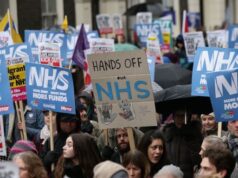Issue: 18
October 2014
This occasional newsletter is researched, written and edited by a group of concerned residents in Ealing, West London who want to preserve our NHS. We view the wholesale engagement of private, for-profit healthcare service suppliers as unnecessary, profligate and dangerous. Process improvement is what is needed in our NHS – not revolution.
Labour Party Finally Go Public on Saving the NHS and the Social Care Service
Andy Burnham, Labour’s Shadow Health Minister, delivered a good speech at Labour’s Annual Conference in Manchester on 24 September 2014. He not only talked about repealing the Health and Social Care Act 2012, but talked about creating a single national health and social care organisation. This is clearly what is needed as we now we have a universal healthcare system interfacing, often unsuccessfully, with a means-tested, public/private social care system.
Labour is also talking about recruiting 8,000 more GPs, 20,000 more nurses and 3,000 more midwives. But some GPs say it’s difficult to hire GPs and as GPs are seen to be under great pressure, one wonders just how many medical students are attracted to become GPs. Many nurses and midwives are up in arms about a pay rise and are threatening industrial action. This is unlikely to act as a magnet to attract new recruits either.
Of course there is the no small matter of money to pay for all this. Raising £2.5 billion annually through a mansion tax, increased duty on tobacco and cutting tax avoidance is a start. But it’s probably going to cost much more than this.
Appalling ECCG 2014 AGM Serves No Useful Purpose
On 17 September 2014 Ealing Clinical Commissioning Group (ECCG) held what it called its Annual General Meeting (AGM). It chose Greenford Hall at 6:00pm on a Wednesday. Currently the centre of Greenford has messy road works and with rush hour this made it very challenging for those who had to travel to the meeting.
In the financial year 2013/14 ECCG purchased £426 million of healthcare services for the citizens of Ealing. ECCG has published online an annual review of its work. This is over 90 pages long! Even NHS England’s annual review report is only 25 pages.
Even though I and others had pre-registered to attend the meeting, there were no badges prepared or agendas or AGM papers given to us. Attendees were asked to submit questions beforehand and Ealing Save Our NHS Campaign – of which I am a member – submitted 20 questions. The meeting Chair said that sometime in the future I would receive written answers to all the questions.
Various ECCG managers spoke at the audience for 50 minutes. Oddly the ECCG Chair did not speak at the meeting and did not even attend it. The visual facilities were dreadful and most people could not read many of the slides displayed. No slide hard copies were made available. Two speakers even covered the same ground – ECCG’s top priorities.
Our questions were very specific. They included concerns about A&E closures and capacity, Maternity accessibility and capacity, Paediatrics, GP challenges, hospital closures, actual out of hospital locations and mental health. However the ECCG speakers were all about the ‘Shaping a Healthier Future’ aspirations and vagaries, with regular doses of ‘pathways of care’, ‘care close to home’, ‘transformation’, ‘reconfiguration’, ‘integrated care’ and ‘patient empowerment’. We’ve heard this stuff so many times now for almost two years. Now clearly the citizens want facts, answers and efficient services. We did hear about the good work that has been done on diabetes, but many of us had heard this success story before.
Although the ECCG had purchased £47 million of mental health care services, the words ‘mental health’ were mentioned by ECCG just twice and 40 minutes into the event. This is the largest individual service spend, but not even headline details were given as to how this cash was spent. There was also very little mention of the increasing demands of the growing elderly population. There was only one mention about the Better Care Fund (BCF), which is a new pooled budget – aiming to integrate health care and social care – to be spent by London Borough of Ealing (LBE) and the ECCG. It was useful to discover that the LBE/ECCG purchasing template for the next two years was to be submitted to NHS England on 19 September 2014. It was underwhelming for ECCG to not even give us the headlines of what LBE/ECCG were wishing to spend the BCF cash on. ECCG never even told the meeting they were soon to move from Greenford to Perceval House in central Ealing.
Incredibly only 15 minutes were allocated for questions and answers. Five of our questions were dealt with (quite inadequately), as well as a few more from the floor. On A&E closures and poor CQC reports about Northwick Park Hospital (NPH), ECCG management were very sanguine. That was until a member of the audience explained that only in the last few days NPH reached capacity in its cardiac unit and new patients were all diverted to Ealing Hospital. Ealing Hospital will soon be eliminated as a major hospital, and what will happen should NPH reach capacity again? Oh, just a one off, said ECCG worthies. The audience was not really convinced of this.
ECCG is accountable to NHS England. It’s also accountable to LBE’s Health and Wellbeing Board. However the latter is dominated by NHS nominees.
An organisation running an AGM normally invites its ‘members’, shareholders and/or stakeholders to an AGM. It’s normal for the financial report to be ‘approved’ by the invitees. None of this went on at this meeting. So one wonders just what was the point of inviting Ealing citizens to this meeting? Was it a public relations exercise? If this is the case, then in my view it was an abject failure.
NHS Central Middlesex and Hammersmith Hospitals’ Accident and Emergency Units Both Close on 10 September 2014
The closure of two NHS hospital A&Es on the same day is unusual enough, but the closure of two of them just two miles apart is surely unprecedented.
Over 50 activists turned up at Central Middlesex Hospital on the morning of the closure to demonstrate their opposition. All the boss of the hospital could offer them was free tea and biscuits.
Reassurances have been given by the NHS that alternative A&E services are readily accessible and available. However one of the local speakers at the demo told us all that he was directed to take his sick child to Northwick Park Hospital A&E in Harrow. It took him an hour by car and when he arrived he was told his child would have to wait three hours for treatment. By 29 September 2014 Northwick Park Hospital bosses were admitting that the hospital needs 80 to 100 additional beds in order to provide an adequate service.
Throughout the whole of the 21 square miles of the London Borough of Ealing there is now just one A&E unit – at NHS Ealing Hospital. And even this unit will be closing before long.
All this is part of the brave new world of the NHS ‘Shaping a Healthier Future’ experiment. But what happens next if the experiment is a failure?
Crazy Accounting Predicts 50% of English NHS Hospitals Will Rack Up £1 Billion in Debt by Financial Year End
If more than half of all NHS hospitals in England are predicted to be showing big annual losses at the end of March 2015, surely there is something seriously wrong with NHS budgeting and NHS financial arrangements?
With rising demands come rising costs to meet these demands. Maybe the £3 billion being spent on re-organising the NHS will result in some efficiency and throughput improvements and maybe it won’t.
What is clearly needed is more cash to be found for NHS hospitals, so that they can continue to provide and maintain quality services that meet peoples’ needs.
Integrating Universal Healthcare With Means Tested Social Care – Is This and the Better Care Fund (BCF) Mission Impossible?
In March of this year the Department of Health admitted the NHS will collapse under pressure if something is not done to improve the way health and social care is provided.
Put quite crudely, hospitals are expensive to run and caring for patients at home and at day care centres is much cheaper. According to Birmingham Community Healthcare NHS Trust it costs £276 a day to keep a patient in hospital. It costs £160 a day to give a patient the maximum amount of care they are allowed at home. Over a year this can mean the care in the community costs £40,000 less than care in hospital. Allegedly 30% of all hospital beds are ‘blocked’ by patients who would be much better off at home, if care could be provided there.
Here in NW London the Government/NHS is cutting costs by closing four out of eight hospital A&E departments and is reducing the number of hospital beds across the region by almost 1,000 by 2015. National Government pays for universal healthcare.
Care homes are also expensive to run. 152 Local Authorities (LAs) pay for means tested social care, which includes funding care home places for those deemed eligible. On average in England it costs £95 a day for day care with nursing. Only those with assets under £23,250 receive financial support. The cost of care is soaring. However, two million new claimants are expected by 2016. Currently 43% of all people receiving social care have to fund it entirely themselves.
Elderly people, who represent more than a third of the patients in hospital beds, are the group which has experienced the greatest reduction in support services as a result of LA budget cuts. According to AgeUK the total number of older service users supported by LAs dropped by 35% to 548,000 between 2006 and 2013.
This is where, presumably, the Government’s Better Care Fund (BCF) comes in. Announced in June 2013, BCF is aimed at funding a transformation in integrating health and social care. It goes live in April 2015. BCF is a single pooled budget to enable the NHS Clinical Commissioning Groups (CCGs) and LAs to work closely together. £1.9 billion will be taken out of local NHS hospital budgets in 2015/16 with a view to it being spent by LAs to divert people from A&Es and speed up discharge. BCF is a five year strategy.
LA Health and Wellbeing Boards in collusion with their local NHS CCGs have less than five months to submit a template setting out their two year BCF proposals to NHS England. These templates will be assessed against a range of criteria, which include delayed transfers of care, emergency admissions, effective re-ablement, admissions to residential and nursing care, and patient and service user experience.
One hopes LAs will spend this money wisely, including helping the one in three over 65s suffering from dementia. What they and their carers need are specialist day care, respite care and intensive domiciliary care, funded by social services but with psycho-geriatric support.
However there is a sting in the BCF tail for LAs. If annual unplanned admissions to hospital by LA patients are not reduced by 3.5% then the NHS BCF money will not be paid to LAs.
Better Care Fund – The Ealing Perspective
Later this year Ealing CCG will move offices from Greenford to the London Borough of Ealing’s (LBE’s) Perceval House offices in the centre of Ealing. This will co-locate the ECCG with LBE Officers carrying out the LBE Health and Wellbeing Board’s (H&WB) wishes.
The composition of the LBE H&WB is intriguing. Out of the 15 members seven are NHS employees! Two of the others have yet to attend a meeting. There are only four elected Councillors. Even Rob Larkman – ex-advertising executive and management consultant – is on the board and he’s had no direct involvement in Ealing healthcare and social care for many moons. He’s no longer a member of the ECCG Governing Body. This board looks to be very much NHS dominated, so in what way is it a legitimate arm of Local Government?
LBE Chief Executive Martin Smith also happens to be Chair of the London Health and Care Integration Collaborative, so he will be well placed in his Perceval House office to oil the wheels of LBE/ECCG collaboration. However, in August 2014 Mr Smith publicly expressed reservations that any further changes to BCF could make it ‘untenable’. He is unconvinced that BCF is a ‘good deal’ for local government.
Achieving Parity of Esteem Between Physical and Mental Health
In September 2014 the Royal College of Psychiatrists published details of six specific areas which the Government must address in order to deliver on its commitment to parity of esteem between physical and mental health. These are:
+ tackling the bed crisis
+ introducing maximum waiting times
+ improving crisis care
+ improving liaison psychiatry services
+ introducing minimum unit pricing for alcohol
+ investing in parenting programmes.
More at www.rcpsych.ac.uk
Key EU Trade Commissioner Says Public Services (eg NHS) are Always Exempted from Free Trade Deals Like TTIP
The BBC has reported that Karel de Gucht, who leads the European TTIP negotiation team, says TTIP will not undermine our NHS. This is good to hear.
The Transatlantic Trade Investment Partnership (TTIP) aims to remove trade barriers between the USA and Europe. Critics argue that it will allow US corporates to run rampant across UK industry and make profits by stripping away regulations which protect our privacy, food safety, the environment and the economy. TTIP threatens to give US corporates powers to take action against private and public UK organisations whose actions they see as endangering their profits. With increasing privatisation on the cards within the NHS, many worry that (via TTIP) US healthcare companies will be enabled to run NHS services and it will be very difficult to get rid of them if they fail to perform.
Health and Social Care in England – By Numbers
+£26 billion – Cost of Dementia (LSE)
+ 6,500,000 – Carers (Carers UK)
+ 1,300,000 – NHS employees
+ 800,000 – Dementia sufferers (DoH)
+ 450,000 – People in care homes
+15,000 – Annual number of patients who die during emergency surgery (Royal College of Surgeons)
+ 7,800 – NHS staff earning over £100,000/year
+ 211 – CCGs (DoH)




